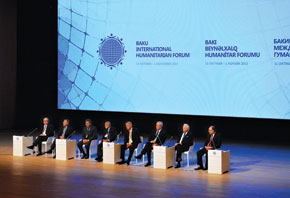 Former Latvian President Valdis Zatlers (centre) speaks at the Baku International Humanitarian Forum. Photo: Tofik Babayev, Gun.az
Former Latvian President Valdis Zatlers (centre) speaks at the Baku International Humanitarian Forum. Photo: Tofik Babayev, Gun.azAnd I also got the chance to congratulate President Ilham Aliyev for hosting the conference. It happened something like this: walking up the entry stairs leading to the ballroom inside the Heydar Aliyev Centre for lunch, my eagle’s eye noticed several large men with coiled microphones sticking out of their ears, giving me hard stares until one or two of them smiled, recognising an old friend – me.
‘Heydar Aliyev’s Presidential Security guys,’ I said to myself, remembering the Old Days. Then, with a jolt, I understood why they were there. Clearly, President Ilham was not far away. In fact, he was almost at my elbow, marching toward lunch along with the rest of us. Thomas, he chuckled, sticking out a hand to shake, I haven’t seen you in a long time! Where have you been?
The main point is that I am back in Azerbaijan, and grateful for it! I said.
Congratulations! This last word served for both the conference and his re-election.
Jamestown Foundation boss Glen Howard was walking to lunch with me, and stepped in to introduce himself, when suddenly Moldovan delegate Aurelia Grigoriu, who had called the Armenians “occupiers” at a conference in Yerevan, boldly stepped forward and drove us two Americans away. Click, click! went the Fuji cameras. Whirr, whirr went the Sony video machines, and the moment was past.
(The salmon lunch, for the record, was tasty, and the evening feast in the Fairmont Hotel – one of the three Flame Towers up near Martyrs’ Avenue – was exquisite. It was the first time I had entered that extraordinary architectural ensemble!)
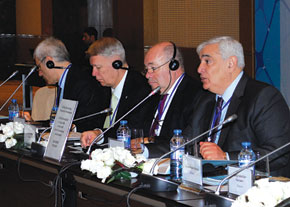 Kamal Abdulla, rector of Baku Slavic University, chairs the round table on multiculturalism. Photo: Tofik Babayev, Gun.az
Kamal Abdulla, rector of Baku Slavic University, chairs the round table on multiculturalism. Photo: Tofik Babayev, Gun.az I do not know exactly what happened on the other panels, but the one I was assigned to – National Identity in the Post-Modern Era – was a freewheeling, insightful and exceedingly open intellectual exchange conducted under the excellent chairmanship of Dr Samad Seyidov, rector of the University of Languages here in Baku.
Presentations ranged from a highly nuanced critique of contemporary world literature by Ukrainian specialist Dr Dmytro Drozdovskiy entitled “Traditions of the Mind in the Anti-Traditional Post-Postmodern Paradigm: Between Sciences and Humanities,” (I admit that this is a mouthful) to a paper by Ms Donna Wyckoff-Wheeler and her new husband Mr Thomas Wheeler about the ‘new’ national identity of citizens of South Africa, deceptively entitled “Creating National Identities in a Not So Post-Modern World”. The point of the paper was a critique of the post-Mandela South Africa, a republic that still has some eight tribal kings whose writ supersedes the South African Constitution among vast swathes of the population, and where the leader of the African National Congress maintains that the ANC shall remain in power until the Second Coming of Christ, meaning Judgment Day…
Other highlights included a hilarious paper by the Austrian writer Peter Grueber entitled “Shepherds, Poets and Footballers Facing Opposing Trends Relating to National Feelings” that underlined the curious fact that we all (of course!) support our local football team over the ‘Evil Others’, despite the fact that in today’s FIFA world, it is more likely that the stars of – say – Istanbul’s Galatasaray Mannschaft will be Colombian or Dutch than Turkish and a nifty and eccentric paper by my new ‘Samurai’ pal from Japan (who came dressed in kimono) Dr Takayuki Yokota-Murakami from Osaka University entitled “Deconstruction of Nation: a Perspective from the History of Russian Jewish Literature”, which deconstructed Mandelstam’s pro-Stalin verses as well as highlighted the idiocy of the ultra-nationalist concept of “premordialism” – namely, that you are stuck with your genes (or what people think are your genes!).
Dr Samad Seyidov was kind enough to offer me a few minutes to comment on these and other papers at the very end of the day, after my raised hand had been neglected at least a half-dozen times. My intervention might have been entitled “An Anti-Ethnic Diatribe: the American Perspective on Nationalism”, in which I pointed out that while the Soviet Union had its own take on what constituted an ‘ethnos’, and while the European Union is still hashing out its own policy toward ‘minorities’ (indigenous folks like the Basque of Spain are fine, as are ‘historical’ oddities such as the Roma/Gypsies, while ‘recent’ emigrant groups such as Pakistanis to the UK, Turks to Germany, do not count...), the elephant in the room was represented by my own country – the USA – which happens to have a completely different view on ethnicity and nationalism than even other ‘emigrant’ nations such as Canada and Australia – namely, race.
Accept it or reject it, I intoned, but my country claims to be founded on the concept of the ‘melting pot’ of whoever arrives, but then determines who is who according to statistical categories that make no sense in the EU or the lands of the former USSR. You are ‘White’, ‘Black’, ‘Native American/Eskimo’, ‘Hispanic’, ‘Asian’ or ‘Other’. So who is my president? ‘White’ or ‘Black’ or ‘Other?’ Who are the ‘Hispanics?’ Mulatto people from Latin America, or anyone from Portugal and Spain? Who are the Asians? Maybe Japanese and Chinese and Vietnamese – but what about the Uighurs, Kazakhs and Turks?
I finished my remarks on a personal note: one of eight children of a German-Irish Catholic family, three of my siblings claim we are ‘German’; three say we are ‘Irish’ and only one other multi-lingual brother and myself maintain that we are ‘American’, a category that does not exist in Soviet-style ethnography. As for the ‘Catholic’ identity marker, I explained that I only discovered that we were at least part Scots-Irish (‘Orange Men’) at age 50, when burying a WWII bombardier uncle in a Protestant cemetery…
Dr Seyidov and others thanked me for this curious intervention, and I thanked him back. I had come without a paper to deliver, but made one up on the spot. It was fun.
There were other presentations and papers from Yakutia (the Saka or ‘reindeer’ people of extreme north-east Russia/Siberia), Belarus, Italy, Australia, Kazakhstan and of course Azerbaijan (delivered in a mixture of highly intellectual Azerbaijani, Russian and perfect English) as well as interventions and extended comments from delegates from Pakistan, Germany, Turkey, the UK and elsewhere. As previously noted, the Humanitarian Forum had attracted hundreds of delegates from some 70 countries, so there is no space to list them all here.
Multi-cultural respect
Finally, however, discussion was to come to a close on the evening of 1 November 2013, and Dr Seyidov ended the session perfectly. After a delegate had said something about the celebrated Azerbaijani ideological concept of ‘tolerance’, Samad muallim took the microphone and announced that he was not satisfied with this idea. I have to paraphrase, because I was not recording his words on tape, but via the old method of pen and ink on paper.
‘Tolerance’ is not good enough, he said. That means I only tolerate you and your ways today, and that my attitude might change tomorrow. No. That is not the position or philosophy of my country, and has never been. There have been papers delivered at this excellent conference by some of the Azerbaijani delegates that touch on not only our Muslim identity, but also our pre-Muslim Christian identity and even our Zoroastrian identity. This is all part of the Azerbaijani heritage and spiritual mixture, and we are proud of it all. There is also the ethno-national mixture that is part of our collective heritage, which we are all proud of sharing. We are Turkic, Kurdish, Talish, Lezghi, Mountain Jewish and Russian and yes, even Armenian. This is us. Accordingly, I recommend that we discard the term of ‘tolerance’, and embrace the much more accurate term of ‘multi-cultural respect’.
Nakhchivan sojourn
The highlight of the 3rd Annual Baku International Humanitarian Forum, however, was arguably not the conference itself but a journey to a selected region of Azerbaijan. I believe there were five choices; mine was to the Autonomous Republic of Nakhchivan, a geographical oddity/exclave bordering Turkey, Iran and Armenia, isolated from the rest of the country and –sort of like Texas, perhaps – the font of political leadership for both Soviet and post-Soviet Azerbaijan.
It is a weird and highly politicised place, and served as the deep base of a certain Heydar Aliyev after he was kicked out of Mikhail Gorbachev’s Politburo in 1986, and it was there I first met Aliyev-in-self-exile in 1991, when no one else in Azerbaijan (or the larger world) seemed to want to have anything to do with this remarkable man. Heydar Aliyev never forgot that first or subsequent visits I paid him before his return to power in Baku in 1993 – and often those visits were in the most challenging circumstances of cold, no running water and reliance on food parcels sent in from Turkey.
Anyway, my last visit was over 20 years ago, and much has changed in Nakhchivan since then. I made my own way into town from the sanatorium, where we were all posted, to the tomb of Huseyn Javid, a great Azerbaijani dramatist repressed by Stalin in the 1930s but then brought ‘home’ from his Siberian grave by Heydar Aliyev in 1982. I prowled around the ‘Potemkin Village’ that is downtown Nakhchivan before linking up for dinner with the former head of the Nakhchivan Young Communist League (Komsomol), an old pal named Babek, who just happened to be in the ancestral homeland for the weekend.
Under Babek’s guidance, some new friends and I made a break from the rest of the group, starting with dinner at an obscure restaurant in Nakhchivan town where we dined on ‘Nakhchivan lobster’ (enormous crayfish from the Araz river that is the border with Iran).
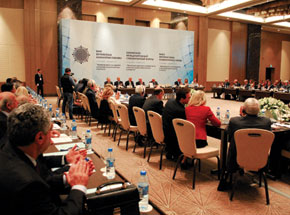 Round table on Multiculturalism and Originality: in Search of Value Consensus in Society. Photo: Tofi k Babayev, Gun.az
Round table on Multiculturalism and Originality: in Search of Value Consensus in Society. Photo: Tofi k Babayev, Gun.az In the morning, the group organiser was getting nervous about our exiting her control, but a cell phone call to Babek put everything back in order: the organiser nearly stood at attention when she heard his cat-purr voice; she, too, had been Komsomol during Soviet times, and he was thus her leader, even 22 years after the collapse of the Communist Party…
We proceeded to the rock face tunnel of an ancient salt mine first drilled by the 17th century Persian/Georgian/Azerbaijani gentleman known as Shah Abbas (who apparently is the default builder/doer of everything ancient around these parts), raced down the 30 or 40 miles of four-lane highway to the Iran crossing point town of Julfa before heading up mountain to a tiny spa of boiling hot water laced with medicinal arsenic for a 10-minute bath at a place called Dari Dag, which translates into something like “Medicinal Poison Mountain”. Apparently, a full treatment of two-week once-a-day 10-minute baths (along with a small slurp of the arsenic-laced hot water) will cure just about anything.
After a triple herbal tea, we actually re-encountered all the official buses at a popular mountain shrine tied to the Koranic verse about The Sleepers, which locals claim is the site where a group of good folks persecuted by An Evil King became petrified for their own preservation for some 500 years, ‘thawing out’ only to discover that the coins in their pockets were hopelessly outdated for use in the local market: proof that a miracle had indeed happened.
On our last evening in Nakhchivan, over an excellent grill of mountain goat and kidney and liver wrapped in lamb fat, we heard a great story from host Babek that addresses the burning question of "Azer-wha?"
Years ago, sometime in the late 1990s, Babek made pilgrimage to the USA and booked himself a hotel room somewhere outside Baltimore.
Desk Clerk: Can you please spell your name, sir?
Babek does so.
Clerk: And what is your passport and nationality, sir?
Babek: Azerbaijani.
Clerk: I beg your pardon?
Babek: Azerbaijani.
Clerk: (Silence) Where is that, sir?
Babek: Between Russia and Iran.
Clerk: Ah, yes! Thank you, sir!
Babek goes to check in the next day, and sees the guest registration book, where he notes his name, followed by 'Between-Russia-And-Iran' listed as his nationality/country of origin...
Let us hope that events such as the Baku International Humanitarian Forum have started to correct this astounding level of ignorance of the basic geographical facts about Azerbaijan – the only country in the world that borders both Russia and Iran.
Anyway, the entire Humanitarian Forum was as important as it was fun, and made even more special for those of us who got to see a slightly different Nakhchivan through Babek’s eyes. Sag ol, Babek!
And sag ol, Azerbaijan!
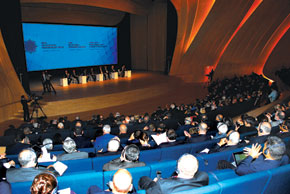

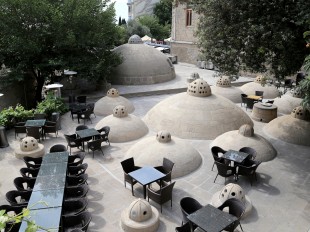
.jpg)